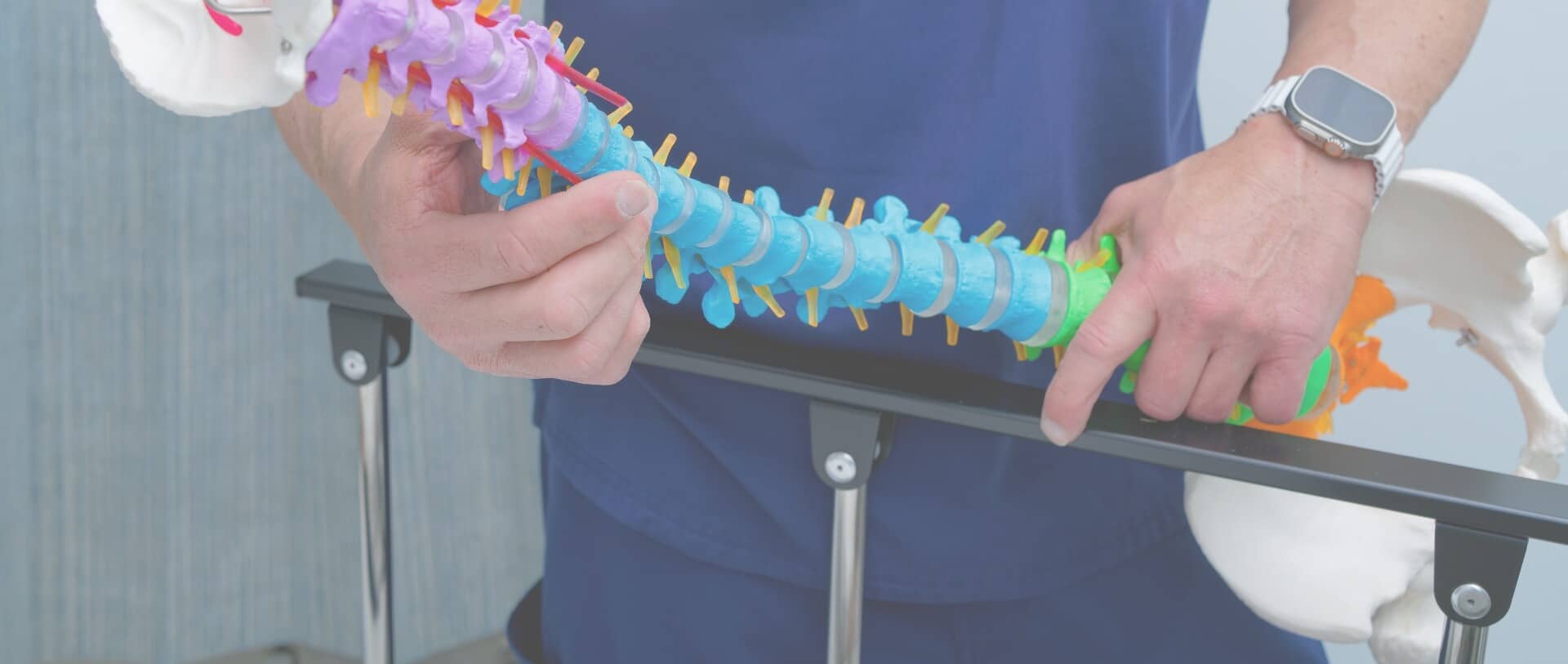
CONDITIONS
Spondylosis
While aging is inevitable, you can mitigate its impact by adopting a healthy lifestyle, prioritizing spine care, and seeking expert guidance at a top center at the first signs that something is wrong. Spondylosis, a type of back arthritis, is a degenerative disease that, when addressed early, doesn’t have to limit you. Find the best treatment for osteoarthritis of the spine at Gottlieb Spine, led by Dr. Jamie Gottlieb. Contact us today for a comprehensive evaluation of your spondylosis treatment options at our convenient location in Irving, Texas.
What is Spondylosis?
Spondylosis refers to the natural degeneration of the spine, which occurs as a normal part of the aging process. The spine consists of 33 vertebrae, stretching from the base of your skull to your tailbone. These vertebrae are stacked one on top of another, with small circular discs of soft tissue in between. These discs provide flexibility for movement, such as sitting, standing, bending, and twisting.
Due to the daily use of the spine, it is common for degenerative changes to occur in the spine, affecting the bones, discs, and joints. These changes may include:
- Osteoarthritis: The cartilage that covers the joints in the spine can wear down over time, leading to joint pain and stiffness.
- Bone spurs: Bony growths, known as bone spurs or osteophytes, may develop on the edges of the vertebrae. These can sometimes press on nerves, causing pain.
- Intervertebral disc changes: Discs become thinner and less flexible with age, reducing their ability to absorb shock and provide support.
- Ligament stiffness: The ligaments that hold the vertebrae together can become thicker and less flexible, contributing to stiffness and reduced range of motion.
- Herniated discs: In some cases, the discs may develop small tears or bulge out of their normal position, potentially pressing on nearby nerves and causing pain or numbness.
Spondylosis is common and is often a normal part of the aging process. While it can lead to symptoms like back pain or stiffness, not everyone will experience discomfort.
What are the Symptoms of Spondylosis?
Degenerative arthritis can cause a range of symptoms and can vary from person to person depending on the location and severity of the degenerative changes in the spine. Common symptoms of spondylosis include:
- Pain
- Stiffness
- Reduced range of motion
- Radiating pain
- Numbness and tingling
- Muscle weakness
- Headaches
If you experiencing pain, stiffness, or any other of the above symptoms, it’s essential to consult with a healthcare professional for a proper evaluation and diagnosis, like the experts at Gottlieb Spine.
Am I at Risk for Spondylosis?
While the risk of developing spondylosis tends to increase with age, several factors can contribute to degenerative arthritis. Risk factors include:
- Age
- Genetics
- Occupation
- Lifestyle factors
- Smoking
- Obesity
- Injuries or trauma
These factors may impact your risk, but it’s crucial to remember that spondylosis is a common spine condition often associated with the natural aging process. Many people with minor degenerative spinal changes may not experience noticeable symptoms and remain asymptomatic.
If you are concerned about your risk of spondylosis or are experiencing symptoms such as back pain or stiffness, you should consult with a spine specialist. Dr. Gottlieb can evaluate your condition and medical history, provide guidance on lifestyle modifications, and recommend appropriate management or back pain spondylosis treatment if needed.
How is Spondylosis Treated?
Although aging and spondylosis are irreversible, there are ways to mitigate their impact. The initial approach to spinal spondylosis treatment typically involves non-surgical methods. Dr. Gottlieb may recommend conservative treatments, including:
- Acupuncture
- Physical therapy
- Massages and chiropractic sessions
- Alternating between hot and cold applications
- Rest
- Lifestyle adjustments
If these treatments prove ineffective in alleviating your pain, there are other, slightly more aggressive treatment alternatives available. These include:
- Prescription medications, such as non-steroidal anti-inflammatories and muscle relaxants
- Steroids, either administered via injection or taken orally
- Antidepressants, known for their pain-relieving properties
If none of these non-surgical methods are successful, the next course of action may involve exploring options for spine surgery.
Will I Need Spondylosis Surgery?
Spondylosis surgery will typically become an option if the spinal cord is being affected by your condition. Such procedures include:
- Laminectomy: This procedure involves the removal of the lamina to create more space within the spinal canal.
- Discectomy: A herniated or damaged disc is removed, aiming to relieve pressure on the spinal cord or nerves.
- Spinal fusion: A fusion stabilizes the spine and reduces pain caused by the friction of adjacent bones rubbing against each other.
- Foraminotomy: A foraminotomy is performed to enlarge the neural foramen, which are the openings through which spinal nerves exit the spinal canal. This procedure helps relieve nerve compression caused by bone spurs or other structures narrowing the foramen.
- Disc replacement: Often done in place of a spinal fusion, an artificial disc can be implanted between the affected vertebrae, allowing for maintained motion at that portion of the spine.
It is most important for you to discuss your condition with a spine specialist who can recommend the most appropriate spinal spondylosis treatment approach.

Top Quality Care at Gottlieb Spine
Understanding spinal spondylosis and its symptoms is the first step towards finding relief. Dr. Gottlieb and his team specialize in degenerative arthritis and can provide expert guidance and personalized care. With the right approach, spondylosis doesn’t have to hold you back from living a healthy and active lifestyle as you age. Contact us today to schedule an appointment.
SCHEDULE A CONSULTATION